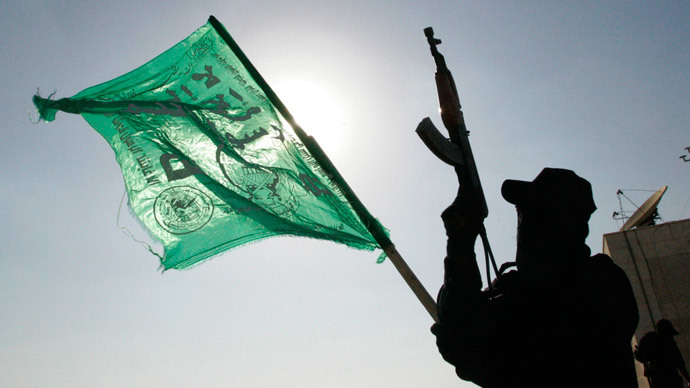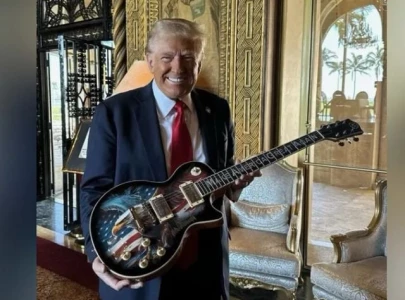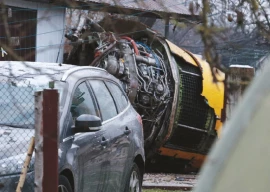
The move comes ahead of a first face-to-face meeting on Wednesday between US President Donald Trump and Palestinian president Mahmud Abbas, whose Fatah party remains deeply divided from Hamas.
The document was unveiled in the Qatari capital Doha by exiled Hamas leader Khaled Meshaal, who is due to step down soon after serving his maximum two terms.
The press conference was also broadcast live in the Gaza Strip, the Palestinian enclave controlled by Hamas, and the document was posted on the movement's website.
Trump set for first meeting with Palestinian president
"We in Hamas believe that renewal and reinvention is a necessity," Meshaal said at the conference in a Doha hotel.
While the new document does not amount to recognition of Israel as demanded by the international community, Hamas officials say, it formally softens its stance in a few key areas.
Hamas leaders have long spoken of the more limited aim of a Palestinian state in the West Bank and the Gaza Strip without explicitly setting this out in its charter.
But after years of internal debate, the new document formally accepts the idea of a state in the territories occupied by Israel in the Six-Day War of 1967.
Hamas offers clemency to Israeli 'collaborators' after killing
It also says its struggle is not against Jews because of their religion but against Israel as an occupier.
"We are not fighting against the Jews because they are Jewish," said Meshaal.
"We are waging this struggle against the aggression of Zionists."
However, the original 1988 charter will not be dropped, just supplemented, in a move some analysts see as a way of maintaining the backing of hardliners.
Palestinian leader meets Trump envoy at Arab summit
Asked if Hamas would negotiate directly with Israelis, Meshaal replied: "Our policy is we will not engage in direct negotiations with the Israelis because nothing in the conditions and circumstances convinces us that any conclusions can be reached."
Direct talks is ‘a process, it's a game we will not fall for it’.
The new document also continues to speak of liberating historic Palestine, including areas that are today part of Israel.
Hamas is considered a terrorist group by Israel, the United States and the European Union, and the new document is aimed in part at easing its international isolation.
Iran leader backs liberation of Palestine from Israel 'tumour'
One Hamas leader, Ahmed Yusef, earlier told AFP the updated charter was "more moderate, more measured and would help protect us against accusations of racism, anti-Semitism and breaches of international law".
It also does not refer to the Muslim Brotherhood, to which Hamas was closely linked when formed.
Israel was not convinced, however, with a spokesman for Prime Minister Benjamin Netanyahu saying "Hamas is attempting to fool the world but it will not succeed".
"They dig terror tunnels and have launched thousands upon thousands of missiles at Israeli civilians," David Keyes said in a statement, referring to rockets fired from Gaza and tunnels used to carry out attacks.
Two Palestinians killed near Gaza-Egypt border: Hamas
Israel and Palestinian militants in Gaza have fought three wars since 2008.
The strip has been under an Israeli blockade for 10 years.
UN officials have called for this to be lifted, citing deteriorating humanitarian conditions, but Israel says it is needed to stop Hamas from obtaining weapons or materials it could use to make them.
Hamas remains deeply divided from Abbas's Fatah, and speculation has mounted over who will succeed the 82-year-old as Palestinian president.
Abbas's first meeting with Trump in Washington takes place on Wednesday.
Thousands of Palestinians without water as Israel cuts supply during Ramazan
The bitter split between Fatah and Hamas has taken a new turn in recent days.
Some analysts say it seems Abbas is seeking to increase pressure on Hamas in the impoverished Gaza Strip, but he risks being blamed for worsening conditions in the enclave of two million people.
In one example, Israeli officials say the Palestinian Authority dominated by Abbas's Fatah has begun refusing to pay Israel for electricity it supplies to Gaza.
Rights activists say exacerbating an already severe power shortage in the strip could be catastrophic.



1732626034-0/BeFunky-collage-(92)1732626034-0-165x106.webp)


1732618327-2/Untitled-design-(7)1732618327-2-270x192.webp)










COMMENTS
Comments are moderated and generally will be posted if they are on-topic and not abusive.
For more information, please see our Comments FAQ